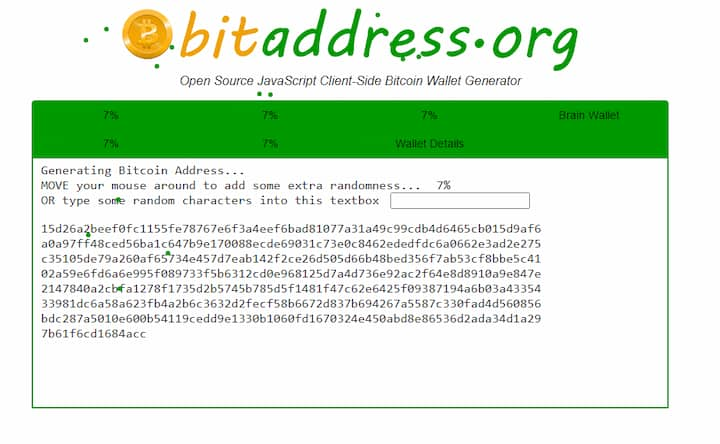A private key is crucial in cryptography and cryptocurrency, serving as the foundation for transaction authorization and ownership proof on the blockchain. Understanding what a private key is, is vital for security in crypto transactions.
Essentially, a private key is a unique, sophisticated cryptographic code integral to accessing and securing digital assets in a cryptocurrency wallet. A private key is more than just a password; it's a critical element in blockchain transactions, used to sign and validate transactions, thereby proving ownership. It underscores its indispensable role in managing digital currencies.
Key Takeaways
- Foundation of Security: A private key is essential for transaction authorization and ownership proof on the blockchain, making it crucial for securing digital assets and executing cryptocurrency transactions.
- Unique Cryptographic Code: Private keys are sophisticated, unique codes generated through complex cryptographic processes, ensuring the exclusivity and security of each transaction.
- Proof of Ownership: Private keys serve as a digital means to prove ownership of cryptocurrency assets, acting like a master key that unlocks access and control over these assets.
- Cold vs. Hot Wallets: Cold wallets store private keys offline and offer more security, whereas hot wallets are connected to the internet, providing greater accessibility but less security.
- Risk of Loss: Losing a private key means losing access to your cryptocurrency assets permanently, emphasizing the need for secure storage and management.
What is a private key?
The realm of cryptocurrency is deeply intertwined with the concept of private keys. A private key is more than just a security feature; it is the backbone of cryptocurrency transactions and ownership. Each private key is a unique alphanumeric code, a result of complex cryptographic processes, ensuring the security and exclusivity of every transaction in the crypto world.
- Role of Cryptographic Hash Functions: Cryptographic hash functions play a fundamental role in generating and securing these private keys. These functions are mathematical algorithms that transform data into fixed-length strings of characters, making it extremely challenging to reverse-engineer the original data from the hash. This adds an additional layer of security to private keys, as they are typically derived from these irreversible hash functions, making it nearly impossible for unauthorized parties to guess or brute force private keys.
- Analogy to Passwords: Think of a private key as an ultra-secure password, but far more intricate. It's stored in a private keys wallet, safeguarding your digital assets. This private key is what distinguishes your ownership and control over your cryptocurrency holdings from others. It's akin to having a key to a treasure chest; the chest can be seen by everyone (the public address), but only the key holder can access the treasure (the crypto assets).
- Essential Knowledge for Cryptocurrency Users: Understanding what is private key is essential for anyone venturing into cryptocurrencies. It's not just about knowing that it exists, but grasping its function and importance. A private key in the world of digital currencies is akin to having a master key to your digital assets. Without it, accessing and controlling these assets is impossible.
Consider a private key example: It's not something you would memorize or write down, but a complex code that resides securely in your wallet, acting as your signature for all blockchain transactions. This level of security and uniqueness is what makes cryptocurrencies like Bitcoin secure and trustworthy.
Why are private keys important?
Understanding the role of a private key in cryptocurrency is essential for anyone involved in the digital asset space. Here's a breakdown of its importance:
- Secret Key to Digital Assets: A private key acts as a secret code, granting access to your cryptocurrencies.
- Proof of Ownership: It is the digital means of proving that you are the rightful owner of the assets.
- Enabler of Transactions: With a private key, you can initiate and validate transactions in the crypto world.
- Access and Control: Without this key, you lose the ability to access or manage your cryptocurrency holdings.
- Security Imperative: The safety of your private key is paramount; losing it equates to losing your digital assets permanently.
What is a Bitcoin Private Key?
A Bitcoin private key is a 256-bit number, which means it's a string of 256 binary digits (0s and 1s). Creating a private key by flipping a coin 256 times isn't secure, so it's best to use specialized tools for generating high-entropy private keys. Keeping your Bitcoin private key confidential is crucial to security, and you should avoid online lists of exposed keys.
Bitcoin private keys can also be represented in decimal format, which is a huge number that's incredibly difficult to reverse-engineer from a Bitcoin address. Websites like Bitaddress.org can help you create randomized public-private key pairs for added security.

How Does A Private Key Work?
In the world of cryptocurrencies, understanding the functionality of private keys wallets is crucial. These wallets are the guardians of your digital assets, safeguarding them through the use of private keys. Each private key is a unique code that plays a critical role in managing and securing cryptocurrency transactions.
Digital Keys and Addresses
Digital keys and addresses are the core components of a private keys wallet. These wallets store your private keys, which are used in conjunction with public addresses to manage cryptocurrency transactions. The private key is like a digital signature; it confirms and secures every transaction you make, ensuring that only you can access and control your digital assets.
Complex Structure and Security
The structure of a private key in crypto is complex, often making it nearly impossible to crack. This level of security is essential, as the private key is the only means of proving ownership and control over your digital assets. The process of generating public keys from private keys is an integral part of how cryptocurrencies function, establishing a secure, verifiable link between your wallet and your transactions.
Analogy to a Mailbox
To simplify the concept, consider the analogy of a mailbox. Your public address is like the mailbox's address, visible to everyone, where people can send you letters. However, only the person with the right key (private key) can open the mailbox and access its contents.
This system ensures the security and integrity of your digital assets, making private keys wallets an essential tool in the cryptocurrency world. The importance of securely managing your private key cannot be overstated, as it is the cornerstone of your cryptocurrency security.
Private Keys and Digital Wallets
Private Keys and Digital Wallets
The interaction between private keys and digital wallets is a fundamental aspect of cryptocurrency management. When you use a digital wallet for your Bitcoin or other cryptocurrencies, the system automatically creates a key pair, which includes your Bitcoin private key and a corresponding public address. This Bitcoin address serves as a destination for receiving funds and is essential for sending and receiving transactions, maintaining the security and accessibility of your digital assets.
Authorizing Transactions and Maintaining Security
One of the primary functions of a private key in a Bitcoin wallet is to authorize transactions. When you want to send Bitcoin, the transaction is signed using your private key. This signature is a way to prove that you are the owner of the funds without revealing your actual private key. It's a sophisticated form of digital authentication that maintains security while facilitating transactions.
In essence, it's like having a unique, secret stamp that only you possess, and when you want to spend your Bitcoin, you stamp the transaction with your private key to verify its legitimacy on the blockchain. This cryptographic process ensures that only the rightful owner can initiate transactions and safeguards the integrity of the entire Bitcoin network.
Storage and Protection
Losing your Bitcoin private key can have serious consequences. It's equivalent to losing complete access to your digital funds. Since the blockchain network is decentralized and secured by cryptography, there's no way to recover a lost private key. This emphasizes the need for secure storage and management of your private keys.
In terms of storing private keys, there are various methods. Some people opt for paper wallets, where the private key is printed on a piece of paper, while others use QR codes for ease of access. However, these methods have their own risks, like being damaged or lost. A more secure option is a hardware wallet, which stores your private key offline, providing an extra layer of security against online threats.
Each method of storing private keys has its own advantages and trade-offs, and choosing the right one depends on your individual needs and the level of security you're comfortable with. The crucial part is to understand the importance of your private key and take appropriate measures to protect it.
Custodial vs. Noncustodial Wallets For Private Key
When it comes to storing private keys, two fundamental distinctions arise: custodial vs. noncustodial wallets.
Custodial Wallets
Custodial wallets, also known as hosted wallets, are managed by third-party services. In these wallets, the service provider has access to your private keys, offering convenience but relinquishing some control.
Non-custodial Wallets
Noncustodial wallets, on the other hand, provide you with full control over your private keys, granting you control over your assets.
Additionally, the debate of cold wallets vs. hot wallets emerges.
Cold Wallets vs. Hot Wallets
- Cold wallets refer to offline storage methods, such as hardware wallets and paper wallets, which are highly secure as they are not connected to the internet.
- Hot wallets, including online and mobile wallets, offer greater accessibility but are considered less secure due to their internet connectivity.
For instance, a custodial hot wallet might be a popular exchange wallet where you trust the exchange to safeguard your private keys. Conversely, a noncustodial cold wallet could be a hardware wallet like Ledger or Trezor, which provides maximum security by storing your private keys offline.
Understanding the trade-offs and choosing the right type of wallet for your private key storage is crucial to safeguarding your digital assets effectively.
Private Key vs Public Key
In the world of cryptography and secure communication, the distinction between a private key and a public key is fundamental. A private key is a confidential, secret code that remains exclusively in the possession of its owner.
It's used for tasks like decrypting messages or signing digital documents, ensuring that only the holder of the private key can perform these actions. On the other hand, a public key is openly shared and serves as an address or access point for others to encrypt messages or verify digital signatures.
While the private key is akin to a well-guarded secret, the public key is freely distributed, working together in a cryptographic system to enable secure and verifiable communication and transactions.
Understanding the roles and interactions of these keys is crucial in the fields of cybersecurity, blockchain technology, and digital privacy.
Conclusion
In the cryptocurrency world, the private key stands as the most critical element for securing your digital assets. It is essential to understand what is private key and its role in private keys crypto management.
A private key is a unique code that grants access to your cryptocurrency, making private keys wallet an indispensable tool for safeguarding your investments. The importance of securely managing your private key cannot be overstated, as it is the definitive factor in maintaining control over your digital assets.
To illustrate this, a private key example would be a unique alphanumeric string that, if compromised, can lead to irrecoverable loss of funds. Hence, effective management and protection of your private key are paramount in the realm of digital currencies.
📧Komodo Newsletter
If you'd like to learn more about blockchain technology and keep up with Komodo's progress, subscribe to our newsletter. Begin your blockchain journey with Komodo today.
FAQ
What if someone gets my private key?
If someone gets hold of your private key, they could access your cryptocurrency wallet and its funds, so it's vital to keep your private key safe, never share it, and be alert to phishing scams while using secure wallets and platforms for your digital currencies.
Can I get private key from public key?
Anything encrypted with the public key can only be decrypted by its specific private key. It's impossible to deduce the private key just by knowing the public key. This allows for the public key to be distributed openly without compromising security.
How is a Bitcoin private key generated?
Bitcoin private keys are generated using complex cryptographic algorithms. They are usually created as part of a key pair, which also includes a public key. The private key is derived from a random number generator and is usually 256 bits in length.
How does a private key ensure transaction security?
When you initiate a Bitcoin transaction, your private key generates a digital signature. This signature confirms your ownership and authorization without revealing the private key itself. It ensures that only the owner can spend the Bitcoin and protects against unauthorized access.
What are the different formats of a Bitcoin private key?
Bitcoin private keys can be represented in various formats, including:
- Hexadecimal: A string of numbers and letters.
- Wallet Import Format (WIF): A more user-friendly format starting with '5', 'K', or 'L'.
- Mnemonic Phrase: A sequence of words that can be used to regenerate the private key.

